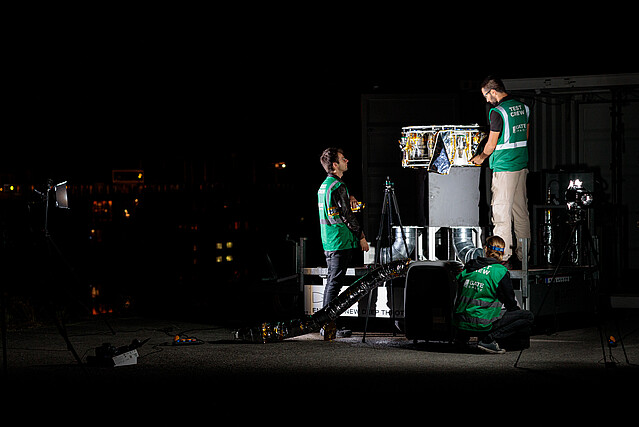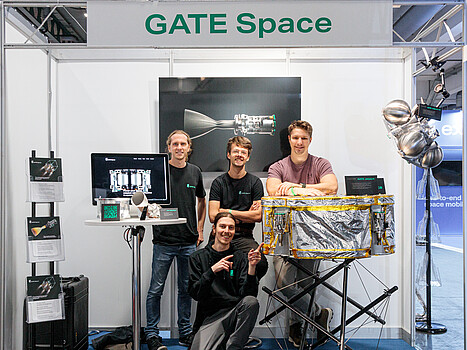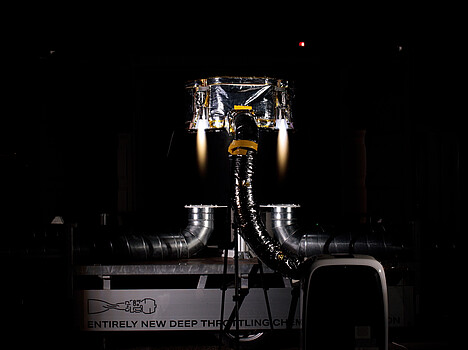GATE Space: Space technology from Vienna, for the world
December 12, 2023|TA
With a goal of making space transport faster, more efficient, and more sustainable, GATE Space develops propulsion solutions for moving satellites. The Austrian company has recently extended its operations to the USA.
“There are currently around 9,000 satellites orbiting the earth,” says Taras Weinl, COO of the Viennese technology company GATE Space – and the number is expected to increase by several thousand per year over the next few years. Demand for satellites and associated coverable functionalities is growing rapidly; the question is how the number of transports into space can be increased to the same extent. GATE Space aims to be part of this development and has developed a propulsion system for smaller satellites that allows them to manoeuvre in orbit, thus making them more sustainable.
The company has developed relatively new thrusters – the “GATE Jetpack” – which are sold both separately and as complete systems to ensure that buyers can deploy them simply without needing their own in-house technicians and developers to assemble purchased elements. Having produced customised propulsion units and satellites so far, GATE Space now aims to develop thrusters and complete systems in series and, thanks to scaling, to be able to offer them even more cheaply, in order to facilitate growth for the entire industry. Satellite applications already extend far beyond the military sector to include meteorology, climate research, animal observation, and communication – and new ones are constantly emerging.
The last mile – in space
GATE Space was founded as a spin-off of the “TU Wien Space Team” with 7 co-founders, including Moritz Novak (CEO), Clemens Weisgram (CFO), Alexander Sebo (CTO) and Taras Weinl (COO). The company’s headquarters have since relocated to the USA, where the bulk of potential customers are currently located, but development and engineering will remain in Austria for the time being. The first satellite with a GATE Space propulsion system is scheduled to embark on its first mission in the first half of 2025.
“Until now, the satellite industry has been dominated by a few large players and government missions, but today we are seeing more and more commercial missions due to falling costs. We anticipate that once we enter the market, our customer numbers will quickly reach double figures,” says Taras Weinl.
Retrofitting satellites with propulsion systems is usually not cost-effective due to the large distances involved – but it is possible, and there are plans to achieve this, too, in the future. The last mile often poses a problem for satellites too: in this case it is a question of how to get them to their final destination once they have been launched into space by a rocket. This is where the “GATE Jetpack” comes into play – it ensures that the satellites remain mobile until deorbiting, i.e. the targeted departure from the Earth’s orbit, which is currently optional but will soon be mandatory.
“Until now, the satellite industry has been dominated by a few large players and government missions. Today we are seeing more and more commercial missions due to falling costs.”
GATE Space’s target group comprises satellites weighing between 50 and 500 kilograms, which, according to Taras Weinl, represent the majority of all satellites. They are focussing on supplying simple plug-and-play integrated systems that already contain all the necessary components for the propulsion system. At the other end of the spectrum, established manufacturers such as Airbus and the French ArianeGroup corporation are continuing to sell individual components that have to be integrated into the systems by the satellite manufacturer at great cost and time expenditure.
GATE Space has already been admitted to the Tech Stars Space Accelerator in Los Angeles, a project of the U.S. Air Force and NASA’s Jet Propulsion Laboratory. The accelerator helps companies to network in the aerospace industry and meet key stakeholders. GATE Space has also been accepted into the Amazon Web Services Space Accelerator, one of the investors being Franz Viehböck, the only Austrian to have ever been in space. GATE Space sees itself as an “international company from Austria for the world”. A new round of financing is planned for early 2024.
GATE Space
Services of the Vienna Business Agency
Funded through the programme Innovation in 2023
Innovation Funding

